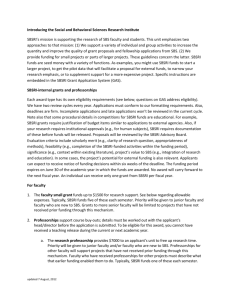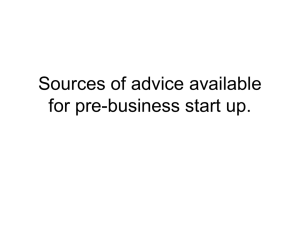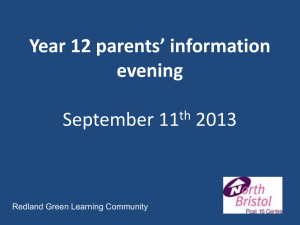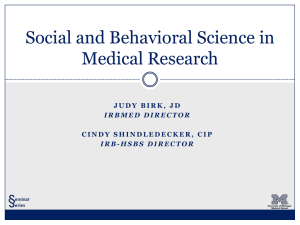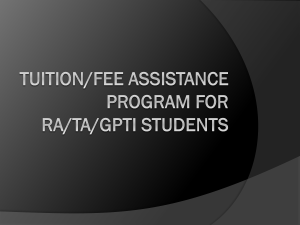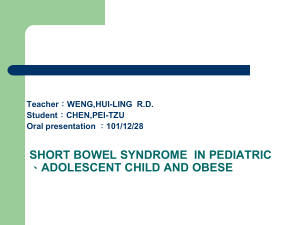Spectrum Review Potential Reform Directions: SBS Submission
advertisement
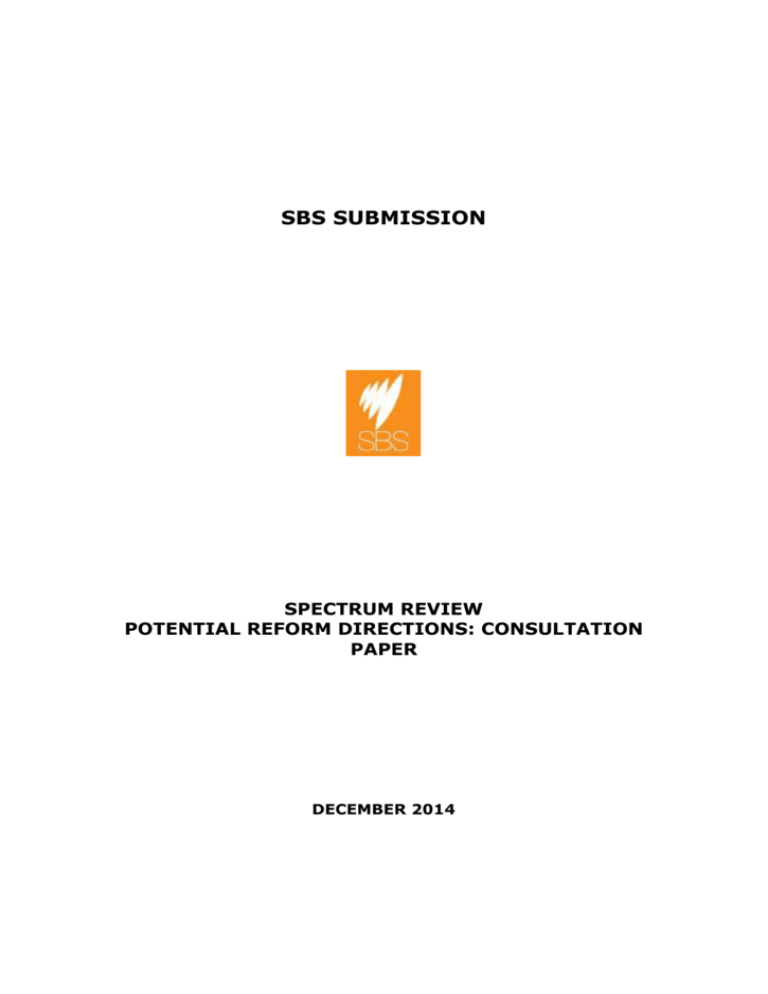
SBS SUBMISSION SPECTRUM REVIEW POTENTIAL REFORM DIRECTIONS: CONSULTATION PAPER DECEMBER 2014 Introduction SBS welcomes the opportunity to provide input into the Government's Spectrum Review, Potential Reform Directions Consultation Paper. SBS is Australia's multilingual and multicultural national broadcasting service, operating under the Special Broadcasting Service Act 1991 (SBS Act). SBS's principal function is to provide multilingual and multicultural radio, television and digital media services that inform, educate and entertain all Australians, and, in doing so, reflect and promote Australia's multicultural society. SBS provides three national television services - SBS ONE, SBS 2, and NITV - on digital terrestrial and satellite television platforms. SBS Radio broadcasts 74 language programs on analog and digital radio, digital television, and via streaming and podcasting online. SBS ON DEMAND delivers online catch-up television and on demand video services. SBS also delivers services via a range of mobile applications. STUDIO and World Movies are SBS's subscription channels, available through Foxtel. Overall SBS is supportive of the Government's positioning of spectrum as a major contributor to Australia's economic and social wellbeing. SBS supports the need for spectrum efficiency and the general reduction in administrative overheads. SBS considers a continuing Government and industry commitment to international harmonisation is important, and will maintain its commitment through involvement with various Australian study groups and the World Radio Conferences coordinated by the Australian Communications and Media Authority (ACMA). Proposal 1: Implement a clear and simplified framework of policy accountability SBS supports a more transparent and forward looking planning process. In particular the provision of an annual work program, following consultation with stakeholders, will provide certainty to stakeholders and contribute to a more efficient spectrum market. SBS would expect some safeguards to ensure that the proposed 'over-arching policy statements' to be issued by the Minister are in line with the objects of the Broadcasting Services Act 1992 (BSA) and the Radiocommunications Act 1992 (RA), and are developed in consultation with industry and community stakeholders. The statement in the Consultation Paper that such policy statements 'may be of limited or no set duration and could be updated or withdrawn at any time' is at odds with the finding that stakeholders 'sought improved certainty in arrangements' (p. 5). SBS therefore requests clarification on the scope of the proposed over-arching policy statements. Proposal 2: Establish a single licensing framework Section 31 of the BSA provides for the Minister to notify the ACMA that spectrum is to be reserved for national broadcasting services. SBS is issued with transmitter (apparatus) licences by the ACMA, and pays a nominal annual fee per service/site. SBS presumes that these arrangements would continue under the proposed single licensing framework. SBS supports the proposed maximum licence term of 15 years, provided that: Seven Billion Stories and counting… 2 the licence term does not impede the implementation of a more responsive spectrum management framework; the licence be subject to existing transmission contracts with service providers (and automatically extended accordingly); and licences can be extended at any point during the 15 year term to ensure certainty of tenure in relation to future service provider negotiations. SBS would envisage that licences for broadcasting services, while not 'apparatus' licences, would still contain the same information onsite, frequency, ERP and directionality of the antenna pattern, polarisation and other parameters important to broadcast transmissions. SBS assumes that the international spectrum band assignments would be upheld and primary assignment of broadcasting services in broadcasting bands be maintained. Proposal 3: More flexible allocation and reallocation processes SBS is concerned that this proposal may affect its ability to operate as an independent national broadcasting service under the SBS Act. Further consideration of appropriate safeguards to ensure the independence of the national broadcasting services from the spectrum market is required. Otherwise, to the extent it can be achieved without increasing administrative red tape and costs, SBS is supportive of the reduction of the direct involvement of the Minister in administrative processes. Proposal 4: Establish a more transparent and flexible approach for spectrum pricing to promote efficient use and re-use of spectrum SBS is supportive of establishing a more transparent and flexible approach for spectrum pricing to promote efficient use and re-use of spectrum. However SBS does not possess the financial resources under current funding arrangements to compete in a competitive spectrum market. There are a number of options for ensuring that public good services such as SBS are able to access spectrum. One method, as noted in the Consultation Paper, is to reserve spectrum from the market to allocate to public good services. In respect of other options, the least interventionist method over time would be to ensure public good services are adequately funded to compete in the market. As noted in the Consultation Paper, a clear and transparent framework for dealing with public good services will need to be considered. Proposal 5: Structuring payment schedules for licences SBS supports this proposal. Proposal 6: The ACMA to take an open data approach to substantially improve the range, availability and quality of information provided to support an efficient spectrum market SBS has no specific comment on this proposal. Seven Billion Stories and counting… 3 Proposal 7: Payment of compensation for resuming all or part of a licence SBS has no specific comment on this proposal. Proposal 8: Facilitate greater user involvement in spectrum management SBS understands that this proposal is in line with other services, including frequency assignment. It is also important to note that the SBS has relied in the past on ACMA field services interference investigation and is not currently funded to support such services within SBS. Should these be moved to a privatised arrangement SBS would need to reconsider with the Government, its role in ensuring interference free access to its services. Proposal 9: Develop more principles-based device supply regulation SBS has found in managing reception enquiries from its audience that there are many devices that do not produce the outcome expected by consumers. Issues include the inability of the device to find closed caption teletext, and delays in processing HD video which causes a loss of synchronisation between audio and video and other technical issues. Typically SBS approaches manufacturers directly to resolve these issues, with varying success. A more consistent industry-wide approach is necessary, and a principles-based approach will support this. To date SBS has not required the ACMA to manage disputes in this area, however should equipment be 'dirty' and not meet C-tick requirements this should be something managed by the Government, given the range of regulatory and enforcement options available to it. Likewise, work, health and safety issues particularly in meeting electrical standards, should remain part of the ACMA's responsibilities. SBS has no specific comment on the proposed changes to the manner in which these important issues are managed. Proposal 10: Improve regulation by extending the suite of enforcement measures available to the ACMA SBS supports this proposal. Proposal 11: The ACMA to continually review options for allocating spectrum to alternative / higher value uses and to ensure that barriers to achieving this are reviewed and removed where appropriate SBS is supportive of proposals to improve the efficiency of the broadcasting services bands spectrum. In order to take advantage of the benefits of next generation broadcasting technologies, and improve efficiencies, it is essential that broadcasters have the capacity to migrate to these new technologies over time. SBS welcomes the increased flexibility in spectrum use for broadcasters to support this transition, as indicated in the Consultation Paper. Seven Billion Stories and counting… 4 SBS is planning to use MPEG-4 as a mix with its MPEG-2 services, to improve the quality and content options of SBS's services. However, it is SBS's view that MPEG-4 in DVB-T is not likely to enable broadcasters to reduce the amount of spectrum occupied by digital television services. SBS is also looking at pathways to introduce ultra-high-definition (UHD) television, additional HD services, and other services to ensure its audiences have access to the best available services. Future SBS services must be competitive with other media to ensure that the high quality content likely to be available in future is accessible to those more heavily reliant on terrestrial access to free-to-air television and radio services. SBS submits that, in order to effectively embrace spectrum efficient technologies the Government and industry should be looking at implementing DVB-T2 with HEVC encoding. While this will require a co-ordinated approach to upgrading user reception technologies (with new set top boxes and/or new digital television sets) in line with transmitter upgrades it will free up additional spectrum for higher economic value users and significantly increase the range and quality of free-to-air services available to all Australians. A second restack process could provide the highest benefit following a move to DVB-T2 and HEVC encoding. Combined with the sixth channel, there is significantly more spectrum that could be made available for other uses while still maintaining high quality television services. SBS is pleased to be given the opportunity to contribute to this consultation paper and we look forward to the next stage in the Spectrum Review. Seven Billion Stories and counting… 5
